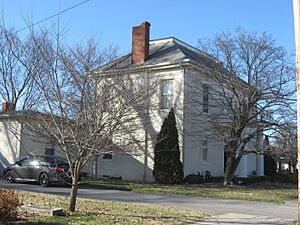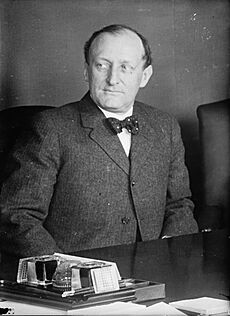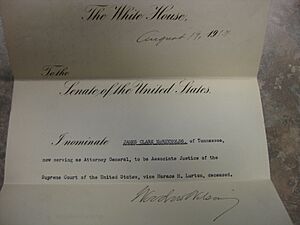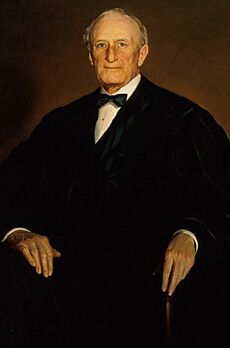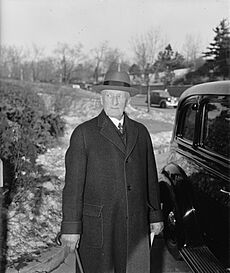James Clark McReynolds facts for kids
Quick facts for kids
James McReynolds
|
|
|---|---|
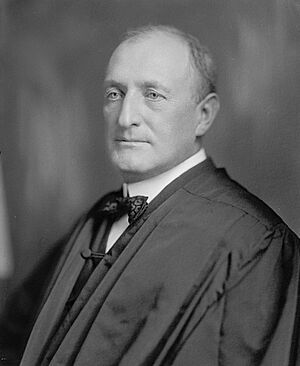 |
|
| Associate Justice of the Supreme Court of the United States | |
| In office October 12, 1914 – January 31, 1941 |
|
| Nominated by | Woodrow Wilson |
| Preceded by | Horace Harmon Lurton |
| Succeeded by | James F. Byrnes |
| 48th United States Attorney General | |
| In office March 15, 1913 – August 29, 1914 |
|
| President | Woodrow Wilson |
| Preceded by | George Wickersham |
| Succeeded by | Thomas Gregory |
| Personal details | |
| Born |
James Clark McReynolds
February 3, 1862 Elkton, Kentucky, U.S. |
| Died | August 24, 1946 (aged 84) Washington, D.C., U.S. |
| Political party | Democratic |
| Education |
|
James Clark McReynolds (born February 3, 1862 – died August 24, 1946) was an American lawyer and judge from Tennessee. He served as the United States Attorney General under President Woodrow Wilson. Later, he became an associate justice of the Supreme Court of the United States. He was a Supreme Court Justice from 1914 until he retired in 1941. McReynolds is known for strongly disagreeing with President Franklin D. Roosevelt's New Deal programs. He also had a difficult personality.
Born in Elkton, Kentucky, McReynolds became a lawyer in Tennessee. This was after he graduated from the University of Virginia School of Law. He worked as a U.S. Assistant Attorney General during President Theodore Roosevelt's time in office. He became well known for his skills in cases about antitrust laws. These laws prevent large companies from unfairly controlling markets. When Woodrow Wilson became president in 1913, he chose McReynolds to be his first Attorney General. Wilson later nominated McReynolds to the Supreme Court in 1914. This was to fill a spot left open by Justice Horace Harmon Lurton's death.
During his 26 years on the Supreme Court, McReynolds wrote many important legal opinions. He wrote 506 majority opinions for the Court. He also wrote 157 dissenting opinions, which means he disagreed with the majority. 93 of these dissents were against the New Deal. He was part of a group of conservative justices called the "Four Horsemen." This group often voted to stop New Deal programs. He retired in 1941 and was replaced by James F. Byrnes. McReynolds wrote important opinions in cases like Meyer v. Nebraska and Pierce v. Society of Sisters.
Contents
Early Life and Education
James Clark McReynolds was born in Elkton, Kentucky, on February 3, 1862. His parents were John Oliver and Ellen McReynolds. His father, John Oliver McReynolds, was a surgeon in the Confederate army during the Civil War. The house where James was born is still standing today. It was added to the National Register of Historic Places in 1976.
McReynolds was a very good student. He graduated from the Green River Academy. Then, he went to Vanderbilt University and graduated as the top student in 1882. He then studied law at the University of Virginia School of Law. He finished his law studies in only 14 months and again graduated at the top of his class in 1884.
After law school, McReynolds worked for U.S. Senator Howell E. Jackson. Senator Jackson later became a Supreme Court Justice. McReynolds also practiced law in Nashville, Tennessee. For three years, he taught commercial law, insurance, and corporations at Vanderbilt University Law School.
He was involved in politics and tried to run for Congress in 1896, but he did not win. From 1903 to 1907, he served as Assistant Attorney General under President Theodore Roosevelt. He then worked as a private lawyer in New York City.
Serving as Attorney General
While working as a private lawyer, McReynolds helped the government with cases about antitrust laws. These laws aim to prevent large companies from becoming monopolies and unfairly controlling industries. He worked on cases against a "tobacco trust" and a monopoly over anthracite coal. Because of his strong work against trusts, President Wilson chose McReynolds to be the 48th United States Attorney General. He started this job on March 15, 1913. He served until he joined the Supreme Court in August 1914. His personality was sometimes difficult, which may have led to his short time as Attorney General.
Time on the Supreme Court
On August 19, 1914, President Wilson nominated McReynolds to be an associate justice of the United States Supreme Court. The United States Senate approved his nomination on August 29, with a vote of 44 to 6. He officially started his job on October 12, 1914.
When the Supreme Court Building opened in 1935, McReynolds chose not to move his office there. He continued to work from his apartment. He believed that the government should not have spent so much money on a new building during the Great Depression.
Important Decisions
During his 27 years on the Court, McReynolds wrote 506 decisions. He also wrote 157 dissenting opinions, meaning he disagreed with the majority. 93 of these dissents were against the New Deal.
McReynolds strongly opposed President Franklin Roosevelt's New Deal laws. These laws were created to help people and create jobs during the Great Depression. Because of his strong opposition, he was part of a group called the "Four Horsemen." This group also included Justices George Sutherland, Willis Van Devanter, and Pierce Butler. McReynolds voted against many New Deal programs. He continued to vote against these laws even after most of the Court started to support them in 1937.
McReynolds believed strongly in laissez-faire economic theory. This idea suggests that the government should not interfere much with the economy. After 1937, when the Court started to uphold more government powers, McReynolds often found himself disagreeing with the majority. He continued to argue that the federal government should not have so much power. For example, in a case about the Social Security Act, he wrote that he could not find anything in the Constitution that allowed the federal government to be "the great almoner of public charity."
McReynolds also wrote two important decisions that used the Fourteenth Amendment to protect individual freedoms. These were Meyer v. Nebraska (1923) and Pierce v. Society of Sisters (1925). In Meyer, the Court overturned a state law that banned teaching modern foreign languages in public schools. McReynolds wrote that people have the right to "acquire useful knowledge" and "bring up children."
In Pierce, the Court looked at a law that forced parents to send their children only to public schools. McReynolds wrote the opinion for the Court, which was a unanimous decision. He said that parents have the freedom to choose how their children are educated. He wrote that the state cannot force children to get instruction only from public teachers. These decisions later helped the Court decide that people have a constitutional right to privacy.
McReynolds also wrote the decision in United States v. Miller (1939). This was the only Supreme Court case directly about the Second Amendment for a long time.
Personality and Relationships
McReynolds was known for having a difficult personality. Chief Justice William Howard Taft once described him as "selfish" and "fuller of prejudice than any man I have ever known." Taft also said McReynolds "delights in making others uncomfortable."
His personality sometimes caused problems with his colleagues. For example, he did not get along with John Hessin Clarke, another justice. Clarke eventually resigned from the Court, partly because of McReynolds's unfriendly behavior. McReynolds refused to sign the usual letter of good wishes for Clarke when he left.
McReynolds was known for having strong biases. He refused to speak to Louis Brandeis, the first Jewish member of the Court, for the first three years Brandeis was on the Court. When Brandeis retired, McReynolds did not sign the customary letter sent to retiring justices. He would often leave the room when Brandeis spoke during meetings.
His difficult behavior was not limited to his colleagues. When Charles Hamilton Houston, a leading African American lawyer, argued a case before the Court, McReynolds reportedly turned his chair around so he would not have to look at him.
Despite his difficult public image, McReynolds was also known for some kind actions. He was very generous to the young pages who worked at the Court. He also had a great love for children. For example, he helped 33 children who were victims of bombing in London in 1940. He also left a large amount of his money to charity. After Justice Oliver Wendell Holmes's wife died, McReynolds cried at her funeral. Holmes once wrote that McReynolds was "a man of feeling and of more secret kindliness than he would get credit for."
McReynolds often hosted gatherings at his apartment. He would invite people for brunch on Sunday mornings. According to Justice William O. Douglas, when McReynolds was in his own home, he was "the essence of hospitality and a very delightful companion." He also hosted an annual Christmas party that was a popular social event.
Retirement and Later Life
McReynolds retired from the Supreme Court on January 31, 1941. He then took on a "senior status" role. He lived in Washington, D.C., until his death.
McReynolds never married. He passed away on August 24, 1946. He was buried in the Elkton Cemetery in Elkton, Kentucky. People in Elkton remembered him fondly.
In his will, McReynolds asked that there be no funeral service in Washington. No members of the Supreme Court attended his funeral in Kentucky. However, he left all of his money to charity. He gave funds to Children's Hospital in Washington, which he had supported for many years. He also left his books and opinions to the Library of Congress. He gave $10,000 and his judicial robe to Vanderbilt University, where he had served on the Board of Trustees for 30 years.
Images for kids
 | Misty Copeland |
 | Raven Wilkinson |
 | Debra Austin |
 | Aesha Ash |


